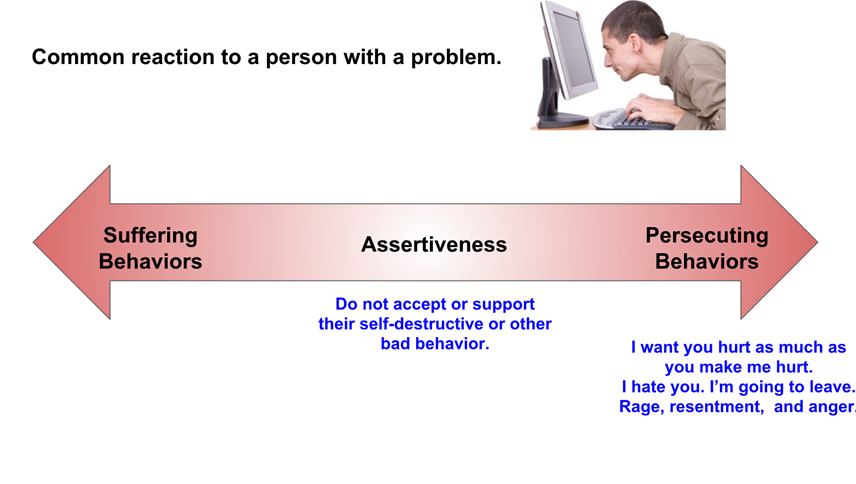Check out:
Brief History of Codependence
How Do Normal Families Adjust To Addiction?
Rescuing Behaviors – First Responders
Suffering Behaviors – Are You A Martyr?
Persecuting Behaviors
Start When The Rescuer Gets Fed Up, Angry and Resentful
Persecuting behaviors comprise the group of behaviors typically experienced by those adjusting to a person with a problem. As noted, the surrounding family members first try to love the identified person into “good” behavior by rescuing or enabling them. It doesn’t work. The rescuer gets fed up, angry and resentful with the person with the problem, and then turns to persecuting behaviors.
The persecutor says things like “Why don’t you grow up! Why don’t you take some responsibility! Why do I have to do everything around here! Why don’t you appreciate what I am doing for you! This is unfair!“

Loved ones become angry because of the identified person’s harmful or embarrassing actions. By definition the identified person has a problem whether it be alcohol, viewing porn, anger, laziness,… etc. Therefore, there is always a “bad’ behavior to be irritated about. A typical reaction to a loved-one’s bad behavior is resentment nagging, threatening, yelling, and blaming.
The position of the persecutor is “It’s all identified person’s fault!” If that person would only stop using alcohol, viewing pornography, get a job, budget their money, or do or not do something – then everything would be okay! Furthermore the persecutor believes he/she can make that change happen if they can yell enough, talk enough, or threaten enough. Or in some cases it’s the “silent treatment” or “cold shoulder.” Either way the message is clear – “I hate this. I resent you. You better stop.”
The diagram below illustrates the common reaction to a person with a problem. One direction is the codependent isolating and experiencing “Suffering Behaviors.” We’ll talk about Suffering Behaviors later. The other common reaction is “Persecuting Behaviors.” Of course recognizing personal feelings and being assertive about those feelings is the healthy behavior.

PERSECUTING BEHAVIORS INCLUDE:
Religious activities decrease
Increased religious behaviors which the codpendent tried earlier as a rescuing behavior fail. Reality sets in because the identified person continues to exhibit the unwanted behavior e.g. viewing porn, alcohol regardless of how many prayers were said. The codependent feels that the prayer and other religious activities attempted as rescuing behaviors were unsuccessful. The codependent, out of despair, often turns away from God to his or her own personal power, returning to the previous level of religious activity because “God didn’t solve” the problem.
Threats
 The codependent becomes desperate because all of the attempts to control or fix the addict seem to have failed. He or she may issue a variety of threats during this stage of codependence. These threats are usually extreme in nature. In the case of a spouse, divorce or separation are suggested. Often in the religious family, threats take the form of laying guilt or shame or the addict in and attempt to force the addict into a sobriety. Such threats are unsuccessful because of their extreme nature and the fact that they are seldom implemented. Most common threats include: “Next time I’m divorcing / leaving!” I heard a teen alcoholic explain this best description of a threat, “All my parents do is bark, they never bite.”
The codependent becomes desperate because all of the attempts to control or fix the addict seem to have failed. He or she may issue a variety of threats during this stage of codependence. These threats are usually extreme in nature. In the case of a spouse, divorce or separation are suggested. Often in the religious family, threats take the form of laying guilt or shame or the addict in and attempt to force the addict into a sobriety. Such threats are unsuccessful because of their extreme nature and the fact that they are seldom implemented. Most common threats include: “Next time I’m divorcing / leaving!” I heard a teen alcoholic explain this best description of a threat, “All my parents do is bark, they never bite.”
Nagging behaviors
The persecutor says the same thing over and over again thinking they surely could say the right thing that would eventually change the identified person’s behavior. They subtly insert rude manipulative comments. Perhaps believing they could hurt or shame the identified person enough that of course they would stop the unwanted behavior and start the wanted behavior. At times, the nagging behaviors can be non-verbal like facial expressions, sighs, or simply not talking-cold shoulder treatment.
Irrational Behaviors
As the addiction/ or problem progresses, codependents become increasingly desperate and reach a pint where they will try almost anything to control the addiction problem. One active member of a church placed honey in her husband’s bedding when he continually came home with pornographic magazines. Other common irrational behavior is hiding the laptop, dumping out the alcohol, etc.
Identified person’s response
Well what does the identified person do with the unwanted behavior, They typically continue the unwanted behavior – porn, alcohol etc after being the recipient of the persecuting behaviors feels he deserves it, look, after all, he says to himself, at what I’ve been putting up with.
Here is the Facebook Live video on Persecuting Behaviors.
Follow me on
(C) Docyoucan 2019

